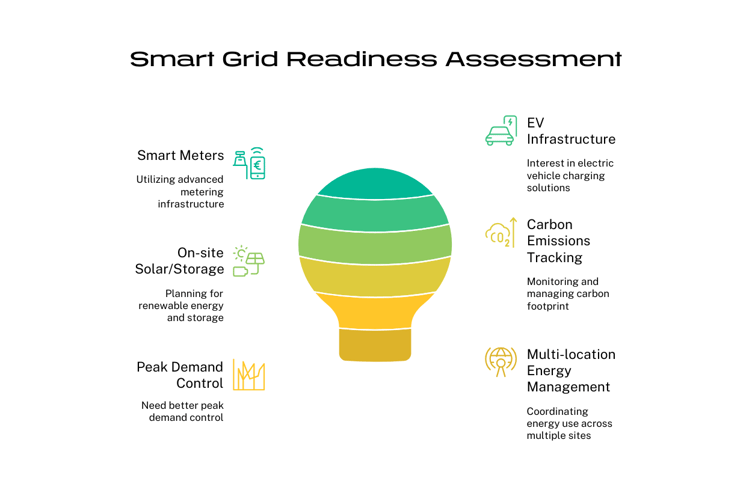The electric grid wasn’t built for the challenges businesses face today: rising energy costs, aggressive decarbonization goals, and increasing demand for reliability. Most U.S. transmission lines are decades old, yet businesses are expected to manage operations with more agility and less environmental impact than ever before.
The smart grid is how the energy system catches up.
More than just a tech upgrade, the smart grid is a reimagined electric power grid that uses digital communication, real-time data, and automation to make electricity delivery more efficient, resilient, and sustainable. For commercial and industrial businesses, it’s a huge step forward, and a key driver of long-term energy security.
What Is a Smart Grid?
A smart grid uses advanced technology to modernize the way electricity is generated, transmitted, and consumed. It facilitates two-way communication between the grid and its users, allowing for faster response to demand changes, better outage management, and smarter energy decisions.
Smart grids are built on a foundation of connected technologies, including:
- Smart meters that record energy usage in real time
- Sensors that identify performance issues and send alerts automatically
- Automation systems that reroute power or adjust distribution instantly
- Advanced analytics forecast demand and support proactive planning
Together, these technologies turn the power grid from a rigid system into a flexible, intelligent energy ecosystem.
What Is a Smart Meter, and Why Does It Matter?
A smart meter is a digital device that records electricity usage in real time and sends that data directly to the utility or energy provider. It’s the foundation of the smart grid, and a powerful tool for businesses seeking better energy performance.
With the support of Advanced Metering Infrastructure (AMI), smart meters allow energy managers to:
- Monitor peak usage periods
- Track performance across facilities
- Receive more accurate billing and usage data
- Make smarter energy procurement and operational decisions
This level of detail helps reduce waste, control costs, and improve energy security across your organization.
Built for a Cleaner Energy Future
Smart grids also make it easier to bring renewables into the mix. Whether it's solar panels on your roof or wind power purchased through a supplier, smart grids are designed to manage the variability of clean energy sources, balancing loads and maintaining grid stability.
They also support:
- Battery storage integration to hold excess generation
- Demand response programs to shift consumption when the grid is under pressure
- Vehicle-to-grid (V2G) connections that turn EVs into backup power sources
The Environmental Protection Agency (EPA) estimates smart grid adoption could reduce U.S. carbon emissions by 12% by 2030.
More Than Meters: A Connected, Intelligent Energy System
Smart grids aren’t just for utilities, they also connect directly with the technologies inside your facilities.
- Energy Management Systems (EMS) give facility teams full control over lighting, HVAC, and more
- IoT-connected sensors optimize equipment performance based on usage and environmental conditions
- Smart EV charging stations adjust charging schedules to minimize grid impact and reduce energy costs
It’s all about having a system that can respond, in real time, to what your operations and the market require.
Challenges Still Ahead
While smart grids offer substantial benefits, implementation isn’t without challenges:
- Cybersecurity risks increase with more connected devices
- Upfront costs can be high, especially for infrastructure upgrades
- Data privacy remains a concern for many users
Grid equity is a real issue; some regions lack access to modernization efforts
That said, momentum is building. Smart grid investments continue to receive funding through federal programs like the Grid Innovation Partnership and provisions of the Inflation Reduction Act, making now a smart time for businesses to take advantage of these opportunities while they’re still available.
Why It Matters for Business
Smart grid technology aligns energy management with long-term performance goals. It enables:
- Lower energy costs through smarter usage and demand control
- Greater resilience during outages or grid instability
- Better integration of on-site renewables and energy storage
- Clearer progress on carbon reduction and ESG benchmarks
- Improved energy security through data-driven, responsive systems

Where Pilot Energy Fits In
Founded in 2001, Pilot Energy is an unbiased and independent energy procurement advisor that empowers leaders to confidently know when, where, and how much energy to purchase by leveraging our unique blend of industry knowledge and innovative digital platforms. Putting our know-how to work daily, we drive clarity and control in decision-making and take pride in providing unparalleled personalized service. Guiding businesses with strategic innovation while committing to sustainable solutions.
Ready to improve energy strategies? Schedule a free consultation from Pilot Energy today!
